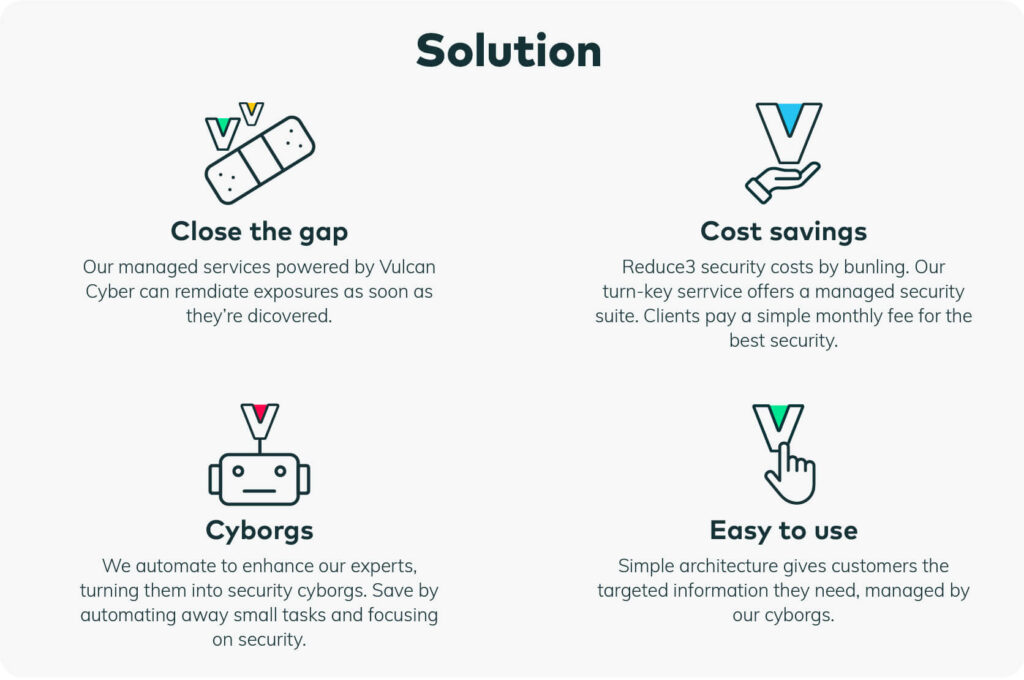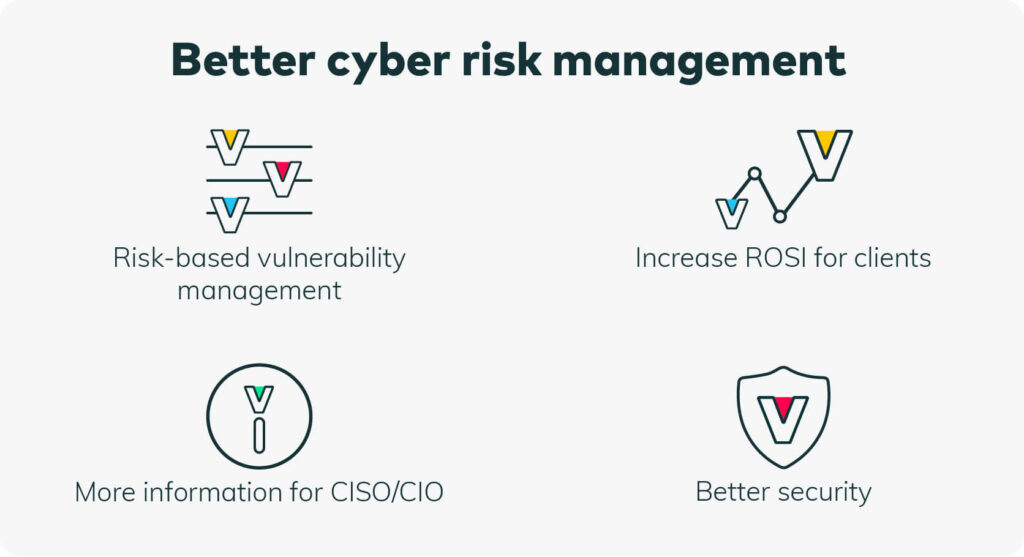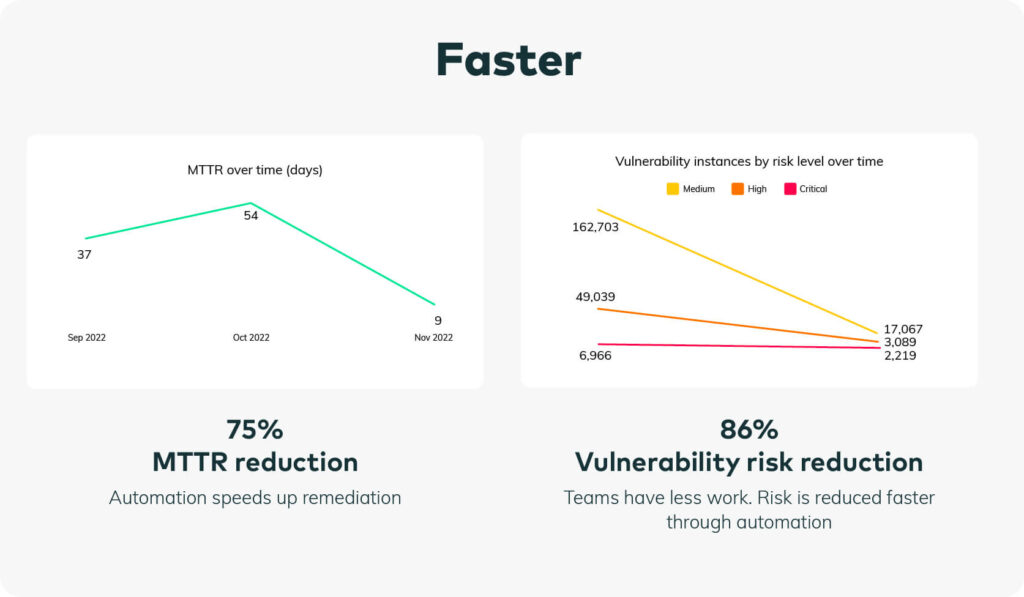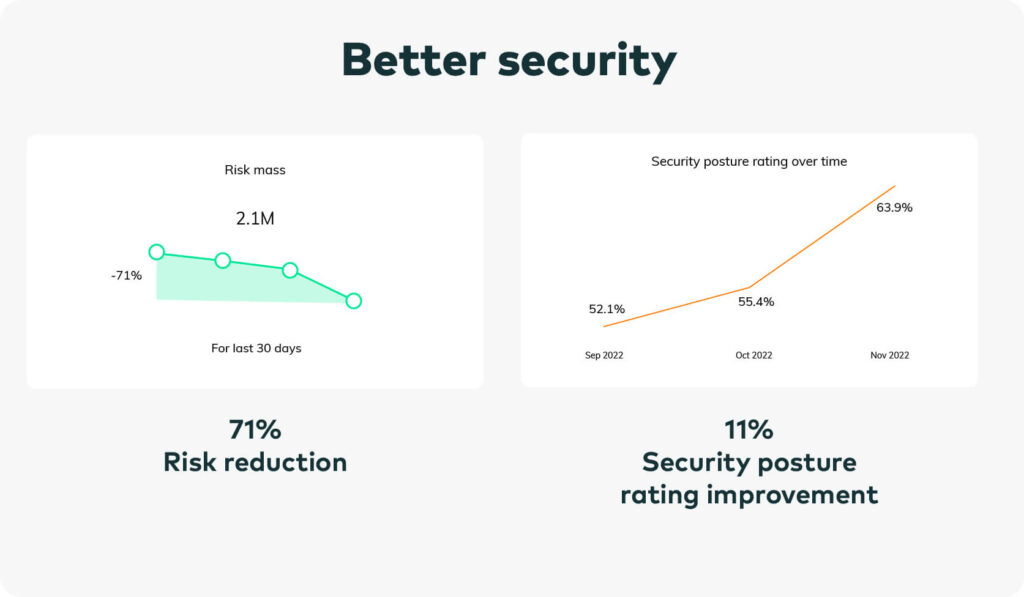The situation
- Customer’s vulnerability processes taking too long
- High cost of personnel and tools
- Ever-changing attack landscape
Vulcan Cyber benefits
- Automation (ticketing, program orchestration…)
- Custom and advanced reporting
- Data consolidation and correlation
About the customer
The customer – an enterprise travel services and insurance provider – needed to reduce the cost and increase the effectiveness of their vulnerability management efforts for faster remediation and reduced exposure time.
The situation
- The client’s security team was dependent on limited, manual processes, threat actors leveraging automation
- Security costs growing and growing,
- Increased need for diverse skillset
- Vulnerability management a sprawling, complex process across multiple tools and teams
The process
- Vulcan Cyber allowed the customer to quickly prioritize and remediate vulnerabilities.
- Automation reduced the time and cost associated with manual processes
- Custom dashboards to help teams communicated and understand risk
- The Vulcan Cyber platform helped teams implement a comprehensive security strategy to reduce risk and improve security posture
The results
- 71% reduction in risk mass for customer
- Reduction in meantime to remediation by over 75%
- Senior management better informed, with clear KPIs and on-demand reporting
Looking for a shorter version? Download the PDF >>
Challenge
In this particular instance, the customer was an enterprise organization with around 2,000 endpoints, and a considerable MTTR of a few months. They had been largely traditional in their vulnerability management processes in the past, and – with attackers lurking – they were keen to reduce the cost and effort involved in their vulnerability management program. That meant faster remediation and reduced exposure time.
Our work in improving security posture for businesses worldwide helped them uncover four key issues present within this organization, and the security industry at large:
Speed
While security teams within organizations must navigate the cyber risk of their entire environments, attackers can move fast and exploit a vulnerability as soon as they are made aware of it. They are also quick to employ the use of automation, and are typically ahead of the curve in this area compared to security practitioners.
Cost
Vulnerability management and cyber security in general are very expensive, and are only getting more so. At the time of writing, the annual average pay for a Vulnerability management engineer is $125,000, according to ZipRecruiter.
Skills required
Organizations usually need to hire an internal security team of diverse skills. Penetration testers, system administrators, and more, all make up the modern-day security team, not to mention the specialized tools needed by each practitioner.
Hassle
Security is not easy. There are constantly new challenges to overcome. An ever-changing attack landscape means that processess, projects and team communication quickly grow out of hand.
All this means a cumbersome, inefficient process that leaves organizations exposed.
To put things in focus, InfoSec reports that the average mean time to remediation (MTTR) in the industry stands at 60-150 days. Considering that attackers today can exploit some vulnerabilities within minutes, and that many of those vulnerabilities affect critical assets, this is an unacceptable timeframe that must be shortened.
Case study: How Snowflake uses Vulcan Cyber for risk-based vulnerability management
Solution
Our focus was on reducing the time it took to actually solve problems.
They took a look at the costs involved and tried to identify what could be cut, without cheapening product or losing functionality and instead finding a better way of delivering value to customers.
They also found that a lot of highly-skilled practitioners were having to perform very low-level tasks that denied them the time and resources to actually focus on the projects and functions that were their areas of expertise.
Vulcan Cyber was able to make things easier for the customer by equipping security personnel with the infrastructure to reduce costs and labor across the board.

Leveraging the platform’s automation capabilities, The customer was able to pass on many of the tedious but necessary tasks to “cyborgs” and free up security professionals to address the more complex and interesting operations needing their skillset.

Moreover, Vulcan Cyber allowed the team to create reports and dashboards specific to the audience. Whether they were presenting their work to developers, other security practitioners, or the CISO or board level, the team was able to articulate the state of their organization’s cyber risk in their audience’s language.

Moving to a risk-based approach has resulted in a greater return on security investment, and better information for CISO and security teams. For us, this was broken down into three areas of improvement:
Faster

Through working with Vulcan Cyber, the customer was able to reduce their MTTR by over 75%, significantly beating the industry average, and closing the window of attack. At the same time, the customer was able to employ automation to improve remediation, going from 220,000 unresolved vulnerabilities to 30,000 over six months – an 86% outcome. With automation taking care of many of these open vulnerabilities, teams were able to turn their attention to other aspects of their work that had previously been neglected due to an unmanageable workload.
Smarter
When we talk about smarter security, we mean moving our customers away from solving vulnerabilities and into the overarching practice of cyber risk management. The partnership with Vulcan Cyber empowered the customer to make more of their resources, and enabled them to be competitive in marketplace with faster remediation times and a better handle on their vulnerability data.
With each task that was automated, time was saved. Together with the Vulcan Cyber platform, the customer was able to save their customer around 1600 man hours over 30 days. Taking into account the industry average salary from earlier, the customer could save $1m a year.
Meanwhile, the C-suite now had more visibility into the organization’s risk. Vulcan Cyber was able to empower members of the board to make informed decisions. And, when the board can see clearly the positive effects of the security effort, they are more likely to invest further into it, giving teams much-needed budget to further improve their cyber risk management program.
Better
A key element of today’s cyber security effort must be looking to the future; staying ahead of the curve when it comes to identifying future attack paths and taking the steps to prevent exposure to them.
Vulcan Cyber enabled the customer to reduce their risk by 71%, with a security posture improvement of 11%.

This was not just about reducing vulnerabilities. Through the Vulcan Cyber platform, administrative controls, improved visibility, asset management, lifecycle management, all contributed to the marked uptick in security posture.
Vulcan Cyber was able to create a much more efficient security infrastructure all around. Most importantly, the partnership liberated security professionals to return to what they do best: uncovering current and future threats, and establishing best practices to address them at speed and at scale.
Want to learn more?
Explore how Vulcan Cyber can help your organization improve the ROI of vulnerability management processes and keep your critical assets secure. Check out the demo here.